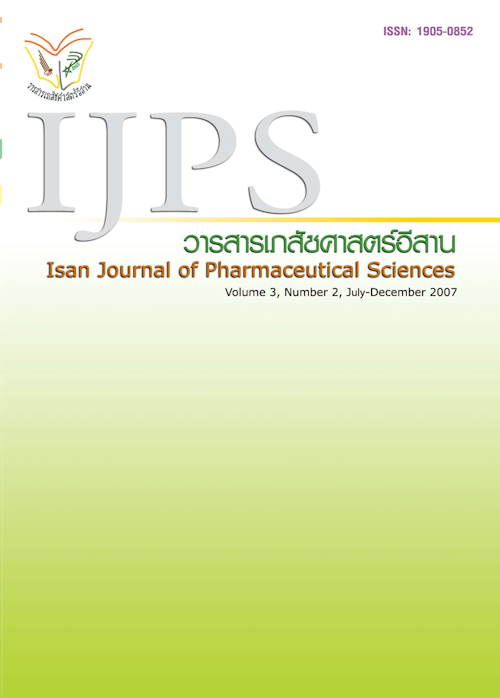The Potential Use of Hospital Electronic Drug Database in Evaluating of Colon Cancer in Patients Receiving Nonsteroidal Anti-inflammatory Drugs (NSAIDs)
Main Article Content
Abstract
The study of utilizing hospital electronic drug database in evaluating of colon cancer in patients receiving Nonsteroidal Anti-inflammatory Drugs (NSAIDs) was conducted in retrospective observational design. The main objectives were to validate the accuracy of hospital electronic drug database by mean of patient medication profiles and patient diagnostic information according to international classification of diseases 10th revision (ICD-10) prior to evaluation of colon cancer. During fiscal year 2000 to 2002, patients who met criteria were randomly assigned into 2 phases of validation. In phase I, the study was aimed to validate an accuracy of medication profiles in hospital electronic drug database comparing to conventional patient medication records. Patients were classified into 2 categories naming ever use and continued use. In ever use group, patients had to at least take one dose of NSAIDs in a calendar year period whereas those in continued use group had to take NSAIDs continuously for at least 6 months period. Standardized questionnaires were sent out to 243 of continued use patients and 500 of ever use patients. Upon analyzing data from standardized questionnaires comparing with data from electronic database and conventional patient medication records, our results demonstrated that in continued use group 73.6% of drug names were in concordance among questionnaires, electronic database and patient medication records. In addition 72% of strength, 69.7% of administration methods and 68.2% of drug quantity were in concordance among these databases respectively. In ever used group the results showed that 76% of drug names, 75.4% of strength, 74.6% of administration methods, and 72.8% of drug quantity were in concordance among the three databases. In phase II, we aimed to validate the accuracy of patient diagnostic information by comparing data retrieved from patient medical records with international classification of diseases 10th revision (ICD-10) and gold standard or National Cancer Comprehensive Cancer Network (NCCN) Clinical Practice Guidelines in Oncology version 2003. From 64 of 80 evaluable patients, our study demonstrated that 59.4% of patients were classified as definite diagnosis, 25% of patients were in probable, 3.1% of patients were in possible and 1.6% of patients were in unlikely diagnosis respectively. In conclusion, the results of this 2 phases study demonstrated that there is a need to improve a reliability of hospital electronic drug database prior to utilize it as valuable resource to evaluate risk of colon cancer. The accuracy of medication profiles of approximately 70% and near 60% in diagnostic information will prompt the administrative authorities to aim improving the level of accuracy of electronic drug database to 80% benchmark before using them as a researching tool.
Article Details
In the case that some parts are used by others The author must Confirm that obtaining permission to use some of the original authors. And must attach evidence That the permission has been included
References
Bennett A, Del tacca M. 1975. Proceedings: Prostaglandins in human colonic carcinoma. Gut 16 (5): 409.
Jaffe BM. 1974. Prostaglandins and cancer: an update. Prostaglandins 6(6): 453-61.
Garcia-Rodriguez LA, Huerta-Alvarez C. 2000. Reduce incidence of colorectal adenoma among long-term user of NSAIDs: a pooled analysis of published studies and a new population-basedstudy. Epidermiology 11(4):129-34.
Giovannucci, Rimm EB, Stanpfer M, et al. 1994. Aspirin use and the risk for colorectal cancer and adenoma in male health professionals. Ann Intern Med 121(4):241-6.
Greene F, Page D, Fleming I, et al. 2002. AJCC Cancer Staging Manual. New York: Springer-Verlag.
Limwattananon S, Limwattananon C, Pannarunothai S. 2003. Use of hospital electronic database for drug utilization analysis: a tool for an evaluation of Universal Healthcare Coverage Policy. Journal of Health Science 12: 169-184.
Marnett LJ. 1992. Aspirin and the potential role of prostaglandins in colon cancer. Cancer Res 52:5575-89.
Marnett LJ, DuBois RN. 2002. COX-2: a target for colon cancer prevention. Annu RevPharmacol Toxicol 42:55-80.
Pamler RH. 1997. Process-based measures of quality: the need for detailed clinical data in large health care databases. Ann Intern Med127:733-8.
Thun MJ, Namboodiri MM, Calle EE, et al. 1993. Heath CW Jr. Aspirin use and risk of fatal cancer. Cancer Res 53(6): 1322-7.
World Health Organization (WHO): Quick Cancer Facts. 2008; Available at URL: http://www.who.int/cancer/en/ Accessed Feb 18, 2008.


